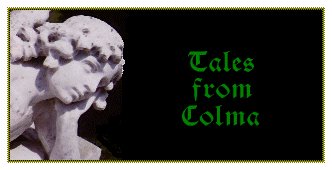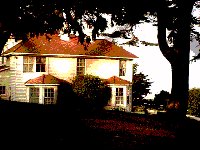
The Murder and Afterlife
of Senator David Broderick
Part Two
by Joel GAzis-SAx
Copyright 1996 by Joel GAzis-SAx



"They are" California Supreme Court Justice David S. Terry told the convention of those Democrats who supported Lecomptom, "the personal followers of one man, the personal chattels of a single individual whom they are ashamed of. They belong heart and soul, body and breeches, to Senator David S. Broderick. They are yet ashamed to acknowledge their masters, and are calling themselves, forsooth, Douglas democrats....Perhaps they do sail under the flag of Douglas, but it is the banner of the black Douglas whose name is Frederick not Stephen."
Some months after these inflammatory remarks, Terry and Broderick met upon a sandy field of honor with Terry claiming himself the victim of Broderick's callous remarks. When Broderick first heard of Terry's speech, he remarked to some friends over breakfast at San Francisco's International Hotel: "I have hitherto spoken of him as an honest man, as the only honest man on the bench of a miserably corrupt court, but now I find I was mistaken. I take it all back. He's just as bad as the others."
Terry's ungentlemanly remarks mystified Broderick. During the activities of the infamous Vigilance Committee of 1856, Terry had opposed the illegal seizure of power by the Vigilantes. In a famous incident, he stabbed a Vigilante by the name of Hopkins in the neck while defending one James Maloney, who was organizing resistance to the Committee. Terry was captured and imprisoned at "Fort Gunnysacks" by the Vigilantes, who planned either to execute him or force him to resign and leave the state forever. (Hopkins survived.) During this time, he was visited and befriended by David Broderick, who admired Terry for his courage in standing up to the Vigilantes.
The elections prevented Terry and Broderick from facing off for several months. When these ended in a defeat of the split abolitionist forces of the anti-Lecomptom Democrats and the new Republican party, Terry and his allies apparently saw their chance to deal with the maverick Broderick once and for all. In the course of the campaign, Broderick said that William Gwin was "dripping with corruption" and had also given Representative Milton Latham reason to defend his personal honor. But it was Terry, a skilled marksman and willing killer, who offered the first challenge. Before offering the challenge, Terry resigned his place on the State Supreme Court. He then went to Oakland and began the correspondence which culminated in his pretension of being the aggrieved party in his exchange of words with Broderick: The champion of "law and order" challenged the protector of the democratic process to an illegal duel.
Broderick accepted.¹ The etiquette of dueling forbade him from making any conciliatory offer since it was Terry who had made the challenge. To have refused Terry would have marked the Senator as a coward. Terry could have made such an offer, but none was made. The first time the two met, a policeman appeared with a warrant for Terry and Broderick's arrest. The two were brought downtown and arraigned, but a motion by the prosecuting attorney to bond both to keep the peace was denied by Terry's former associate, Judge Henry P. Coon. The seconds arranged for another meeting at the same spot near the upper end of Lake Merced.
Fog drifted in on a cool, moist wind from the Pacific, which was only a few hundred yards from where the men stood. As the seconds measured the ground and negotiated the terms of the duel, Broderick paced in the sand and Terry stood quietly with his personal surgeon. Neither showed any fear or anxiety we are told by the witnesses. The two men doffed their heavy overcoats and allowed themselves to be searched for hidden deflectors or armor. Broderick's seconds won the choice of position. The Senator positioned himself with his back to the sun, which making an effort to present itself through the mists that covered San Bruno Mountain to the east. Terry's seconds secured for him the choice of weapons and he chose a pair of oddly-shaped, ornate French pistols which he had brought along for the occassion. He had been practising with these for several months prior to his making of the challenge. The gunsmith who loaded the weapons later testified that the pistol which was assigned to David Broderick had a hair trigger. He claimed to have warned the Senator's seconds of this flaw. They denied this.
Zoeth Eldredge describes the duel in his History of California:
The word was now exemplified as it would be given, and then both were asked if they were ready. Judge Terry answered promptly, but Broderick apparently finding some difficulty in adjusting the peculiar pistol to his hand, hesitated slightly and then he also answered "ready".
Mr. Colton began to give the word "Fire-one-two," but between the word "fire" and "one" Broderick's weapon was discharged, the ball striking the ground only nine feet in front of him. The adjustment of the trigger had been so delicate that the weapon was discharged while he was elevating it. He was now disarmed, nevertheless he stood as firmly and calmly as before, awaiting the bullet of his adversary. It came before the word "two" was pronounced, striking him in the right breast. Convulsively his right arm -- the hand still grasping the pistol--was raised nearly in line with his shoulder, extended nearly full length and then fell by his side. Then his head dropped to his breast, and sinking first on his left knee, he fell to the ground.²
 The unremorseful Terry stood watching, holding what he must have thought was a "chivalrous" pose, as Broderick's surgeon examined the Senator. The wound had hit a vital part. The Senator had only hours to live. As they took him away to the house of his friend Leonidas Haskell, he remarked to one of his seconds "They have killed me because I was opposed to a corrupt administration and the extension of slavery."
The unremorseful Terry stood watching, holding what he must have thought was a "chivalrous" pose, as Broderick's surgeon examined the Senator. The wound had hit a vital part. The Senator had only hours to live. As they took him away to the house of his friend Leonidas Haskell, he remarked to one of his seconds "They have killed me because I was opposed to a corrupt administration and the extension of slavery."
Broderick was mourned throughout the city. Newspapers began to speak of the duel as a political assassination. An open air funeral was held in Portsmouth Square and Edward Dickinson Baker delivered the funeral oration over the body:
He was honest, faithful, earnest, sincere, generous, and brave; he felt in all the great crises of his life that he was a leader in the ranks; that it was his high duty to uphold the interests of the masses; that he could not falter. when he returned from that fatal field, while the dark wing of the Archangel of Death was casting its shadow upon his brow, his greatest anxiety was as to the performance of his duty. He felt that all his strength and all his life belonged to the cause to which he had devoted them.
Broderick's death led to a dramatic reversal in the attitude of California politics. Voters realized that it was not abolitionists and populists like Broderick who were threatening the union; it was the Chivalrists who were willing to burn towns and kill those who did not vote their line who were the danger. Baker's characterization of the duel as a "political necessity, poorly veiled under the guise of a personal quarrel" won the hearts of the electorate. With the outbreak of the Civil War a year and a half after Broderick's death, both Gwin and Terry fled the state to join the Confederacy. Baker returned to Pennsylvania to form a regiment of returned Californians and died at Balls Bluff in 1861. The arrival of Unitarian minister and abolitionist Thomas Starr King in 1860, helped finalize the securing of California for the Union and led to a partnership between Western bankers and Northern industrialists. After four years of war, California's King Gold defeated the South's King Cotton, just as Broderick might have predicted it would.

